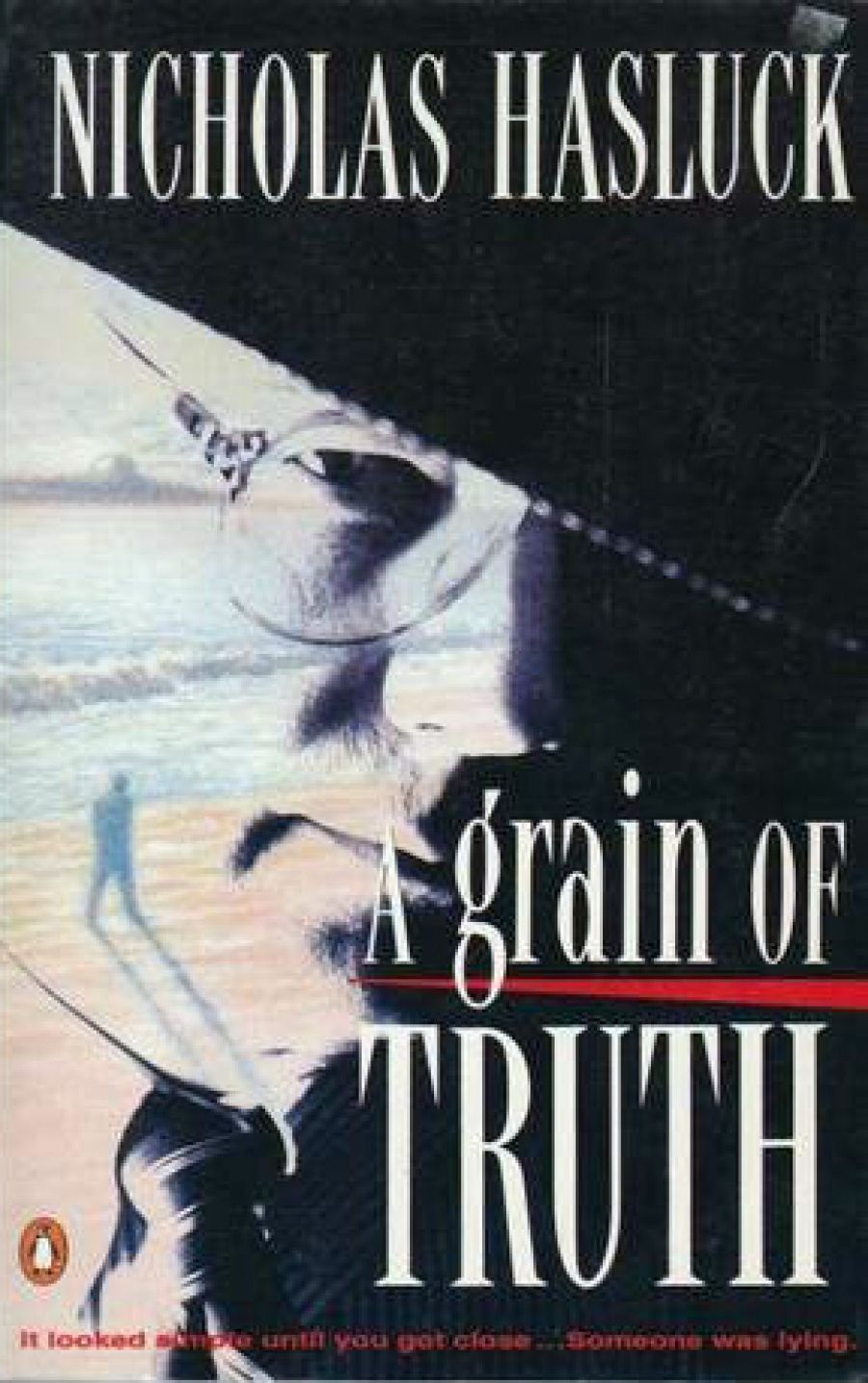
- Free Article: No
- Contents Category: Fiction
- Review Article: Yes
- Online Only: No
- Custom Highlight Text:
As Nicholas Hasluck’s latest novel points out more than once, the adversarial system of judgement upon which this country’s law is based consists of the telling and re-telling of stories. The prosecution presents a version of events, the defence uses the same facts but tells a different story and, in summing up, the judge constructs a third one. Finally the jury is empowered by society to decide the ‘truth’. Counsel for the prosecution and for the defence are obliged to argue their respective points of view to the limit of their professional ability. The most effective way of doing this, as one of Hasluck’s characters points out, involves ‘subverting rational argument – constantly interrupting, confusing witnesses with nit-picking questions, blocking the presentation of crucial facts, shaping the truth to suit his client’s case’.
- Book 1 Title: A Grain of Truth
- Book 1 Biblio: Penguin, $14.95
Of course, five minutes of Rumpole or any of the plethora of film and TV courtroom dramas have long since demonstrated this to us. But A Grain of Truth goes very much further, to investigate practical, political, and ethical implications arising out of this process – in the form of another story.
A Grain of Truth is set in the former penal colony of Blosseville which figured in two earlier books by Hasluck, The Country Without Music and The Blosseville File. In A Grain of Truth Blosseville’s history of financial fiasco, 1980s entrepreneurship, and impending Royal Commission teasingly present themselves as a re-telling of events surrounding the WA Inc. affair in Hasluck’s home state of Western Australia. The novel’s plot starts with a drug scam. Tos Tyeck, who alleges collaboration with the Drug Squad (‘Drug Abuse Team’), is subsequently charged by them with possession. An insufficiently cropped photograph carried by the Sunday Mail, together with an article supporting Tyeck’ s allegations, leads in turn to a defamation case against the newspaper by Drug Squad members. The same lawyer is involved in defending both Tyeck and the paper and not only does he become aware of inconsistencies in Tyeck’s testimony but his involvement in the case and interest in prompting a Royal Commission into the matter is compromised by his intention to stand as a candidate for Blosseville’s opposition Conservative Party
All this is presented in the novel from the point of view of a colleague called Michael Cheyne. Cheyne is a man of integrity taking stock of his profession and life, including its failures. He is an earnest but, for me, impersonal character and in this respect he sets the tone for the book. In sharing Cheyne’s thoughts we observe the day-to-day issues of life in a modern legal practice which occupy a significant part of A Grain of Truth, including the court room protocol, collisions with senior judges who pursue the letter and not the spirit of the law, and office politics and romance. Beyond all these things is Cheyne’s preoccupation with the law which he sees as an institution that can remain humane only if subject to constant questioning and review. ‘The law is living history, a maze of reinterpretation’, Cheyne says, alluding to the symbolic architect of Blosseville, Henri Revenant.
In a 1991 article published in Australian Book Review entitled ‘Bright light with shadows’, Hasluck suggested regretfully that a ‘well-documented work of non-fiction’ dealing with ‘ambiguous contemporary issues’ will generally receive a better reception in Australia than a work of drama or fiction dealing with the same material. This threatens to suppress political fiction in general and the contemporary ‘novel of ideas’ in particular. Hasluck’s solution has been to create the fabulous state of Blosseville, which can by turns appear surreal and disturbingly close to the bone.
No one would question that the maintenance of a just and effective legal system, the subject matter of Hasluck’s new novel, is ambiguous and challenging in the extreme. A Grain of Truth in fact blurs the problematic distinction the author previously proposed between ‘non-fiction’ and ‘fiction’ and demonstrates how a narrative built out of all sorts –legal practice, the history of jurisprudence, the legacy of the 1980s, post-colonialism, politics, anecdotage, the press, and the dirty world of drug-dealing – can be informative, provocative, free from the constraints of the purely documentary, and offering powerful entertainment at the same time.


Comments powered by CComment